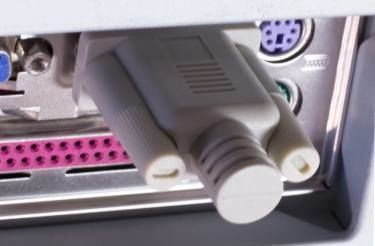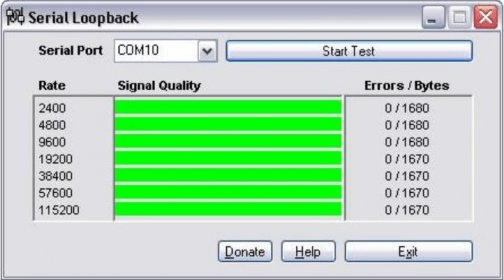
- #Loopback serial cable for free#
- #Loopback serial cable Patch#
- #Loopback serial cable code#
- #Loopback serial cable Pc#
You would then implement the server side of the connection locally in another program - allowing the client to connect and issuing the data and control commands as needed.
#Loopback serial cable for free#
You might be able to get this driver for free from Digi, Lantronix, etc in support of their real standalone serial port servers.
#Loopback serial cable Pc#
What you would do is find or implement a client com port driver that would implement the client side of the system on your PC - appearing to be a real serial port but in reality shuttling everything to a server. RFC 2217 covers a com port to TCP/IP standard that allows a client on one system to emulate a serial port to the local programs, while transparently sending and receiving data and control signals to a server on another system which actually has the serial port. I can think of three options: Implement RFC 2217
#Loopback serial cable Patch#
A patch exists under "contrib" to provide RFC2217 support for negotiating serial line settings. For Unit tets, socat is likely nicer than remserial because you can directly cat files into the PTY. Socat (also GPL) is like an extended variant of Remserial with many many more options, including a "PTY" method for redirecting the PTY to something else, which can be another instance of Socat. You should be able to run two remserial instances to create a virtual nullmodem like com0com, except that you'll need to set up port speed etc in advance. It transmits the serial data in "raw form" to a network socket STTY-like setup of terminal parameters must be done when creating the port, changing them later like described in RFC 2217 does not seem to be supported.

In Open Source, Remserial (GPL) may also do what you want, using Unix PTY's. There are other commercial alternatives, such as. Not sure about the license at this point, or whether they want to make it available commercially only in the future. You may want to look at Tibbo VSPDL for creating a linux virtual serial port using a Kernel driver - it seems pretty new, and is available for download right now (beta version). If anyone is interested in my version of the code, send me a message and I'll send it to you.
#Loopback serial cable code#
There's still code missing for hardware flow control managed by the driver, but I don't need it because I'll be managing the pins myself using TIOCMGET/TIOCMSET/TIOCMIWAIT from user mode code. There were a lot of issues, but now it works well for me. I spent yesterday and today rewriting the driver. There was an initialization missing, and the completely untested TIOCMIWAIT code caused a crash of the machine. The crash in the office really was the driver's fault. The handling of TIOCMIWAIT seems in place, but it never wakes up because the corresponding call to wake_up_interruptible() is missing. The code seems to be copied from some "tiny tty" example code. The second thing is that TIOCMIWAIT does not work. I can't check until I'm back in the office on monday. I don't know for sure but I think it crashed a machine in the office I was working on from home. While the driver looks promising, it seems unstable. I guess I was a little quick with my enthusiasm. You may need to fix the file permissions to be able to use the devices.

The devices are /dev/tnt0 to /dev/tnt7 where tnt0 is connected to tnt1, tnt2 is connected to tnt3, etc. When the module is loaded, it creates 4 pairs of serial ports. Just insert a few lines at the top of the module/tty0tty.c source (after the includes): #ifndef init_MUTEX On a recent kernel you may get compilation errors. It even implements TIOCMGET/TIOCMSET and TIOCMIWAIT iotcl commands! The best thing about it is that is also emulates the hardware pins (RTC/CTS DSR/DTR).

I don't know why it only got thumbs down on sourceforge, but it works well for me. It is a simple kernel module - a small source file. There is also tty0tty which is a real null modem emulator for linux.


 0 kommentar(er)
0 kommentar(er)
